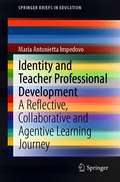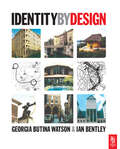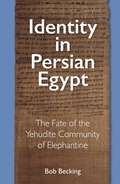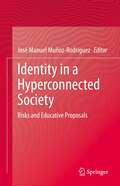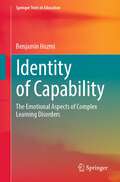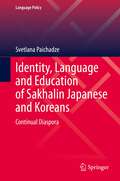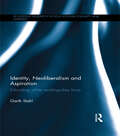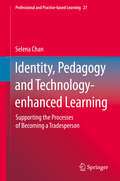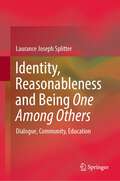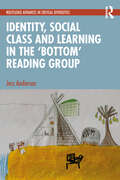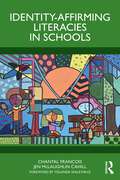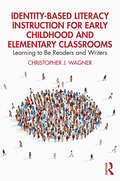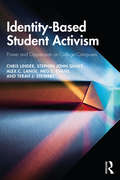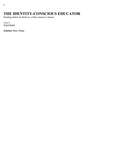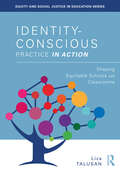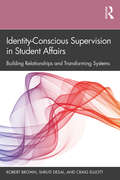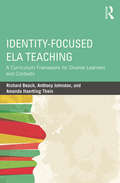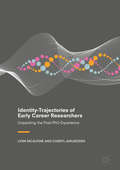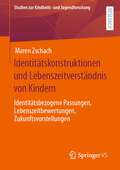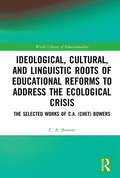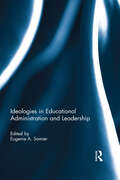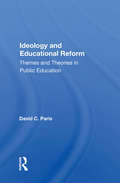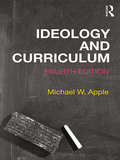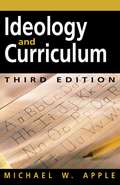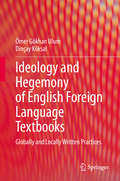- Table View
- List View
Identity and Teacher Professional Development: A Reflective, Collaborative and Agentive Learning Journey (SpringerBriefs in Education)
by Maria Antonietta ImpedovoThis book addressed teachers’ necessity to be able to respond to the new needs and demands caused by an ever-evolving educational system, as recognized in the national and international policy and research literature. The book proposes an analysis of the features that shape the journey of the teacher profession and professionalism, a journey which needs to be collaborative, agentive and dialogical: • Collaborative in changing the personal and professional teacher development from an individual and solitude process toward a joint discovery with mutual enrichment and shared directionality; • Agentive in the ability to activate internal and external resources for an individual, productive and communicative transformation; • Dialogical in the ability to enrich the personal narrative with the voices of others and opening spaces for dialogue and listening. The seven chapters are structured in a way that gives flow and pace to the unfolding story of the developing teacher identity and is informed by a whole range of research and literature. This book serves as a reference point for teacher-students, in-service teachers and teacher educators who are interested in their professional development and looking for new perspectives. It also offers some helpful insights for administrators who need to make ICT decisions on course development in teacher education.
Identity by Design
by Georgia Butina-Watson Ian BentleyIn a world of increasing globalisation, where one high street becomes interchangeable with the next, Identity by Design addresses the idea of place-making and the concept of identity, looking at how these things can be considered as an integral part of the design process.Structured around a series of case studies including Prague, Mexico, Malaysia and Boston, the authors discuss an array of design approaches to explain and define the complex interrelated concepts. The concluding sections of the book suggest ideas for practical application in future design processes. With full colour images throughout, this book takes the discussion of place-identity to the next level, and will be valuable reading for all architects, urban designers, planners and landscape architects.
Identity in Persian Egypt: The Fate of the Yehudite Community of Elephantine
by Bob BeckingIn this book, Bob Becking provides a comprehensive and up-to-date overview of the origins, lives, and eventual fate of the Yehudites, or Judeans, at Elephantine, framed within the greater history of the rise and fall of the Persian Empire. The Yehudites were among those mercenaries recruited by the Persians to defend the southwestern border of the empire in the fifth century BCE. Becking argues that this group, whom some label as the first “Jews,” lived on the island of Elephantine in relative peace with other ethnic groups under the aegis of the pax persica. Drawing on Aramaic and Demotic texts discovered during excavations on the island and at Syene on the adjacent shore of the Nile, Becking finds evidence of intermarriage, trade cooperation, and even a limited acceptance of one another’s gods between the various ethnic groups at Elephantine. His analysis of the Elephantine Yehudites’ unorthodox form of Yahwism provides valuable insight into the group’s religious beliefs and practices. An important contribution to the study of Yehudite life in the diaspora, this accessibly written and sweeping history enhances our understanding of the varieties of early Jewish life and how these contributed to the construction of Judaism.
Identity in a Hyperconnected Society: Risks and Educative Proposals
by José Manuel Muñoz-RodríguezThis book is about the formation of identity, primarily in adolescents, and the danger inherent in creating that identity in the context of a hyperconnected world. It provides scientific and regulatory pedagogical knowledge associated with these risks in creating identity, primarily among young people, arising from increasing, and increasingly important, screen connection times. It proposes solutions to the educational challenges of constructing identity in a hyperconnected society. The book focuses especially on the process of identity formation in this instance, where both adolescents and the adults who teach them have forgotten the vital need to incorporate educational theories and principles, novel, experimental and basic, kn any discussion of adolescent identity work.
Identity of Capability: The Emotional Aspects of Complex Learning Disorders (Springer Texts in Education)
by Benjamin HozmiThis textbook focuses upon understanding the importance of building an identity of capability as a means of growth, giving, and living a rich and satisfying personal and interpersonal life for people with complex learning disorders. Through this book, teachers will gain a greater understanding of the emotional world of these students and will be able to ‘tune in’ and build trust. The volume presents tools for facilitating ‘empowered teaching’ which supports teachers to create a learning climate that will enable students with complex learning disorders to build trust, gain understanding, and promote development. Establishing an identity of capability will enable students in general, and adults with complex learning disabilities in particular, to identify their true strongpoints, to conceptualize them, and to place them at the forefront of their self-image. The text provides many lively examples for empowering teaching and for implementing the principles of intervention and teaching to students with complex learning disorders as presented in the book. It offers a revision of the teacher’s role and tools for creating an accepting climate within the class that will enhance learning processes.
Identity, Language and Education of Sakhalin Japanese and Koreans: Continual Diaspora (Language Policy #31)
by Svetlana PaichadzeThis book explores the issues of education, the use of languages and the formation of self-identification of the Japanese and Korean diasporas of Sakhalin, over a hundred years period: from the time they moved to the island, until their “return” to historical homelands in Japan or South Korea. During this time, their language environment and language of education changed 4 times and Japanese and Korean of Sakhalin continued to be a linguistic and ethnic minority.This book is of interest to researchers, students, NGO supporters and education policy makers.
Identity, Neoliberalism and Aspiration: Educating white working-class boys (Routledge Research in Educational Equality and Diversity)
by Garth StahlIn recent years there has been growing concern over the pervasive disparities in academic achievement that are highly influenced by ethnicity, class and gender. Specifically, within the neoliberal policy rhetoric, there has been concern over underachievement of working-class young males, specifically white working-class boys. The historic persistence of this pattern, and the ominous implication of these trends on the long-term life chances of white working-class boys, has led to a growing chorus that something must be done to intervene. This book provides an in-depth sociological study exploring the subjectivities within the neoliberal ideology of the school environment, in order to expand our understanding of white working-class disengagement with education. The chapters discuss how white working-class boys in three educational sites enact social and learner identities, focusing on the practices of 'meaning-making' and 'identity work' that the boys experienced, and the disjunctures and commonalities between them. The book presents an analysis of the varying tensions influencing the identity of each boy and the consequences of these pressures on their engagement with education. Drawing on Bourdieu’s theoretical tools and a model of egalitarian habitus, Identity, Neoliberalism and Aspiration: Educating white working-class boys will be of interest to academics, researchers and postgraduate students in the field of sociology of education, and those from related disciplines studying class and gender.
Identity, Pedagogy and Technology-enhanced Learning: Supporting the Processes of Becoming a Tradesperson (Professional and Practice-based Learning #27)
by Selena ChanThis book gathers work from over a decade of study, and seeks to better understand and support how learners become tradespeople. The research programme applies recent concepts from neuroscience, educational psychology and technology-enhanced learning to explain and help overcome the challenges of learning in trades-learning contexts. Due to the complex and multifarious nature of the work characterising trade occupations, learning how to become a tradesperson requires a significant commitment in terms of time, along with physical and cognitive effort. All modalities (visual, aural, haptic etc.) and literacies (text, numerical, spatial etc.) are required when undertaking trade work. Manual dexterity and strength, coupled with the technical and tacit knowledge required for complex problem solving, not to mention suitable dispositional approaches, must all be learnt and focused on becoming a tradesperson.However, there is a substantial gap in the literature on 'how people learn a trade' and 'how to teach a trade'. In this book, contemporary teaching and learning approaches and strategies, as derived through practice-based participatory research, are used to highlight and discuss pragmatic solutions to facilitate the learning and teaching of trade skills, knowledge and dispositions. The approaches and strategies discussed include the implementation of technology-enhanced learning; project-based inquiry/problem-based learning; and recommendations to ensure learners are prepared for the future of work.
Identity, Reasonableness and Being One Among Others: Dialogue, Community, Education
by Laurance Joseph SplitterThis book brings the tools and ideas of Anglo-American analytic philosophy to bear on how we think about issues of contemporary significance, in a way that is accessible to a broad audience. While acknowledging empirical findings within the social sciences, it takes on the prescriptive task of imagining a better world, in which being citizens in a democracy means actively engaging with others. We cling to tribal affiliations which incline us to look inward and spurn those whom we deem to be “other.” And we observe the mind-numbing, herd-like impact of social (and other) media on our capacity – and that of our children – to distinguish truth and good sense from falsehood and nonsense. Such problems demand our attention as reasonable persons who both think for themselves, and deliberate in good faith with others with whom they may well disagree. The good news is that while reasonableness cannot be taken for granted, it can – indeed, it must – be nurtured and it must be taught. This book both articulates a conception of reasonableness and exemplifies a clear standard of reasonableness, with respect to the questions it raises and the author's responses to them.
Identity, Social Class and Learning in the ‘Bottom’ Reading Group (Routledge Advances in Critical Diversities)
by Jess AndersonThe common practice of ability-grouped reading in UK schools, often termed guided reading, influences children’s sense of identity, feelings and progress as readers. Drawing on a rich ethnographic study of three primary classrooms, this book reopens a critical inquiry into ability-grouped reading that has been quiet since the 1990s, when guided reading in literacy education became established practice in the UK and the US.Through the lens of children’s agency in accommodating, resisting and at times transforming such reading pedagogy, the book shows how readers are shaped by ability-grouped reading and by the more egalitarian reading pedagogies introduced in the study. Children’s individual and collective experiences are brought to life through extended narratives that attend as closely to gesture, posture, visage, silences and prosody of speech as to spoken words.The book ends with a provocation: how literacy pedagogy might change if reflexive noticing and dismantling of hierarchies become the compass of pedagogical change. This demands attention to structural inequalities around race, gender and class and a turn towards deep listening to children. As well as being a valuable read for scholars of the sociology of childhood and education, it should appeal to anyone concerned with making education more equitable, including teachers, school leaders, parents, carers and policymakers.
Identity-Affirming Literacies in Schools
by Chantal Francois Jen McLaughlin CahillIn Identity-Affirming Literacies in Schools, Chantal Francois and Jen McLaughlin Cahill combine their teaching, leadership, and research at Pearl Street Collaborative School in New York City to provide an intimate portrayal of what it means to strive toward a humanizing literacy pedagogy.This book weaves the thread from the school’s dreams about humanizing literacy to the everyday work that extended and nurtured those dreams. By elevating urban students’ and teachers’ unique, diverse, but often devalued voices, this book describes how the school’s collaborative and equity-oriented professional culture informed asset-based dispositions and instructional practices through a relationship-oriented independent reading program; robust engagement with diverse texts, including intersectional, young adult, LGBTQ+ literature; opportunities to foster empathy; rich, text-based discussions; and teacher-designed authentic literacy assessments. This book explores opportunities for students to fluidly engage with their identities, knowledge about the world, the school community, and texts.Identity-Affirming Literacies in Schools will appeal to pre- and in-service educators, especially those considering secondary literacy education and social change, who may use this book for coursework or professional learning.
Identity-Based Literacy Instruction for Early Childhood and Elementary Classrooms: Learning to Be Readers and Writers
by Christopher J. WagnerAn essential text in literacy and teaching methods, this book introduces the concept of identity in literacy learning and provides guidance toward designing identity-based literacy instruction in early childhood and elementary classrooms. An identity approach to literacy learning asks teachers to see and engage with the ways that children make and remake ideas about who they are as readers and writers as they learn about language and literacy. This book explores what literacy teaching can look like when literacy is reframed as an identity practice, and it prepares readers to design literacy instruction using an identity-based instruction framework that focuses on four strands of teaching and learning: community, skills, membership, and reflection and narrative-making. Each chapter draws on examples of units and lessons developed by teachers using the four strands of the identity-based instruction framework, including instructional activities and resources. This is a foundational book for pre-service and in-service teachers to learn and develop the necessary tools to implement literacy instruction that recognizes and responds to the many possibilities of who children are becoming as readers and writers.
Identity-Based Student Activism: Power and Oppression on College Campuses
by Stephen John Quaye Chris Linder Alex C. Lange Meg E. Evans Terah J. StewartHistorically and contemporarily, student activists have worked to address oppression on college and university campuses. This book explores the experiences of students engaged in identity-based activism today as it relates to racism, sexism, homophobia, transphobia, ableism, and other forms of oppression. Grounded by a national study on student activism and the authors’ combined 40 years of experience working in higher education, Identity-Based Student Activism uses a critical, power-conscious lens to unpack the history of identity-based activism, relationships between activists and administrators, and student activism as labor. This book provides an opportunity for administrators, educators, faculty, and student activists to reflect on their current ideas and behaviors around activism and consider new ways for improving their relationships with each other, and ultimately, their campus climates.
Identity-Conscious Educator: Building Habits and Skills for a More Inclusive School
by Liza A. TalusanLearn powerful, practical strategies for creating an inclusive school community. The Identity-Conscious Educator provides a framework for building awareness and understanding of five identity categories: race, social class, gender, sexual orientation, and disability. Connect with vignettes and personal stories from the author that illuminate how to address identity topics in your personal and professional life. Then, develop skills in engaging in meaningful interactions with students and peers.
Identity-Conscious Practice in Action: Shaping Equitable Schools and Classrooms (Equity and Social Justice in Education Series)
by Liza TalusanWhen teachers and leaders implement an identity-conscious practice, they can provide a more responsive and responsible learning environment. Unfortunately, avoiding the impact of identity can create problematic and oppressive conditions in schools. So how do we lead with an identity-conscious lens? Award-winning author Liza Talusan provides real-world scenarios that educators can work through to apply an identity-conscious practice. Talusan helps educators grapple with three key questions: 1) How do I build knowledge about scenarios that involve identity? 2) How do my own thoughts, attitudes, behaviors, and beliefs contribute to inequitable conditions? 3) What actions can I implement in my classroom/meeting spaces to align with principles of equity and justice? Readers explore these questions through case studies on race, class/socioeconomic status, religion/faith, disability, sexual orientation, gender, language, and age. With the book's numerous real-world examples, Talusan makes the concept of an identity-conscious practice more tangible, so you feel ready and empowered to implement it day-to-day in your own practice.
Identity-Conscious Supervision in Student Affairs: Building Relationships and Transforming Systems
by Robert Brown Shruti Desai Craig ElliottThis guide offers current and future student affairs practitioners a new conceptual framework for identity-conscious and intersectional supervision. Presenting an original and transformative model to address day-to-day challenges, this book gives practitioners a strategic approach to engage in self-work, identity exploration, relationship building, consciousness raising, trust development, and organizational change, ultimately helping them become more adept at supervising people from a range of backgrounds and experiences. Chapters include theoretical underpinnings, practical tips, case studies, and discussion questions to explore strategies in real-life contexts. Identity-Conscious Supervision in Student Affairs is a key tool for student affairs practitioners to effectively change systems of dominance and inequity on their campuses.
Identity-Focused ELA Teaching: A Curriculum Framework for Diverse Learners and Contexts
by Richard Beach Amanda Haertling Thein Anthony JohnstonCountering the increased standardization of English language arts instruction requires recognizing and fostering students’ unique identity construction across different social and cultural contexts. Drawing on current sociocultural theories of identity construction, this book posits that students construct multiple identities through use of five identity practices: adopting alternative perspectives, exploring connections across people and texts, negotiating identities across social worlds, developing agency through critical analysis, and reflecting on long-term identity trajectories. Identity-Focused ELA Teaching features classroom activities teachers can use to put these practices into action in ways that re-center implementing the Common Core State Standards; case-study profiles of students and classrooms from urban, suburban, and rural schools adopting these practices; and descriptions of how teachers both support students with this instructional approach and share their own identity-construction experiences with their students. It demonstrates how, as students acquire identity-focused practices through engagements with literature, writing, drama, and digital texts, they gain awareness of the ways exposure to different narratives, beliefs, and perspectives serves to mediate their own and others’ identities, leading to different ways of being and becoming over time.
Identity-Trajectories of Early Career Researchers: Unpacking the Post-PhD Experience
by Cheryl Amundsen Lynn McAlpineThe book asks how we can make sense of career paths for PhD graduates, something that has rarely been systematically studied. It offers a coherent synthesis of the empirically-based insights that arose from the experiences of 48 early career researchers, who were participants in a 10-year qualitative longitudinal research program. The book has the power to inform other researchers’ conceptual and methodological approaches to the study of post-PhD career trajectories. The authors draw on the conceptual lens of ‘identity-trajectory’, which emerged from their research program, to examine the decision-making processes underpinning the careers of PhD graduates, whether contingent researchers and teachers, assistant professors within the academy or professionals elsewhere. The book highlights the role of personal agency in negotiating academic and non-academic work and careers within broader personal lives. It will be compelling reading for researchers and students working in the areas of Education and Sociology, particularly those with an interest in examining career development and decision-making.
Identitätskonstruktionen und Lebenszeitverständnis von Kindern: Identitätsbezogene Passungen, Lebenszeitbewertungen, Zukunftsvorstellungen (Studien zur Kindheits- und Jugendforschung #6)
by Maren ZschachWie erzählen und beschreiben Kinder sich selbst und ihre Lebenszeit? Die Studie untersucht diese Frage anhand vergleichender Rekonstruktionen von zwölf biographischen Interviews mit Zehn- bis Elfjährigen. Im Ergebnis werden vier verschiedene Identitätstypen herausgearbeitet, die sich in ihrer Orientierung an Autonomie und Anpassung bzw. dem Streben nach Anerkennung unterscheiden. In einer sinngenetischen Typologie werden die unterschiedlichen Bezugnahmen auf Identität diskutiert. Es zeigt sich, dass eine geringe Passförmigkeit zwischen diesen Orientierungen dominiert und eine balancierte Identität demgegenüber randständiger ist. Diese Analyse, die mit der Dokumentarischen Methode durchgeführt wurde, basiert auf identitätstheoretischen Annahmen von Mead, James, Goffman und Honneth sowie spezifischen Betrachtungen der Selbstentwicklung insbesondere von jungen Menschen wie z.B. von Krappmann oder Keupp u.a. Aus soziogenetischer Sicht ist ein Ergebnis, dass die erarbeitete Identitätstypologie schulformspezifische Unterschiede aufweist. In einer relationalen Typologie korrespondiert eine Betrachtung von Lebenszeit als Wandel mit Typen einer stärkeren identitätsbezogenen Passförmigkeit, während Kontinuitätsannahmen von Zeit eher für Identitätstypen zutreffen, in denen eine starke Autonomie- oder Anpassungsorientierung dominiert.
Ideological, Cultural, and Linguistic Roots of Educational Reforms to Address the Ecological Crisis: The Selected Works of C.A. (Chet) Bowers
by C. A. BowersIn this volume C.A. (Chet) Bowers, whose pioneering work on education and environmental and sustainability issues is widely recognized and respected around the world, brings together a carefully curated selection of his seminal work on the ideological, cultural, and linguistic roots of the ecological crisis; misconceptions underlying modern consciousness; the cultural commons; a critique of technology; and educational reforms to address these pressing concerns. In the World Library of Educationalists series, international scholars themselves compile career-long collections of what they judge to be their finest pieces – extracts from books, key articles, salient research findings, major theoretical and/practical contributions – so the world can read them in a single manageable volume. Readers will be able to follow the themes and strands of their work and see their contribution to the development of a field, as well as the development of the field itself. Contributors to the series include: Michael Apple, James A. Banks, Joel Spring, William F. Pinar, Stephen J. Ball, Elliot Eisner, Howard Gardner, John Gilbert, Ivor F. Goodson, and Peter Jarvis.
Ideologies in Educational Administration and Leadership
by Eugenie A. SamierIdeologies in Educational Administration and Leadership explores ideological dimensions of educational administration in a number of Western and Central European contexts as they influence or shape the understanding, analysis, and practice in the field covering a broad range of topics, such as ethics, governance, diversity, and power. The first section, Philosophical and Theoretical Foundations, includes a range of sociological, political and linguistic approaches to examining ideology in an educational context. The second section, Ideologies of Research and Teaching, includes examinations of neoliberal and technological effects on research and teaching, as well as ideological shifts and challenges, in the West and in Eastern Europe. The last section, Contemporary and International Issues, includes critiques of social media, neoliberal impact on schooling, managerial leadership, university ideologies in Finland, the rationalisation of universities, and the impact of administrative ideologies on school systems. The book will appeal to researchers, practitioners, policy-makers, academics, as well as post-graduates in educational administration theory, and related courses in the ethics and politics of education, educational leadership, and organisational studies.
Ideology And Educational Reform: Themes And Theories In Public Education
by David C. ParisIdeology and Educational Reform traces the underlying ideological problems that make genuine educational reform difficult. It describes three major themes in public education: common school, human capital, and clientelism.
Ideology and Curriculum
by Michael AppleSince 1979, Ideology and Curriculum has been a path breaking statement on the relationship between cultural and economic power in education. The new edition of this now classic text has been updated by celebrated author and activist Michael W. Apple to include a full new chapter on the book’s lasting critical agenda in the context of the contemporary conservative climate. A new substantive preface introduces the fourth edition, reflecting on earlier arguments and developments from the intervening years while a concluding interview details the author’s background and continuing efforts toward building a more equitable society. In celebration of the 40th anniversary of its publication, this highly-anticipated new edition firmly situates Ideology and Curriculum as one of the most important education titles of our time.
Ideology and Curriculum (3rd Edition)
by Michael W. AppleTo celebrate the 25th anniversary of its publication, Michael W. Apple has thoroughly updated his influential text, and written a new preface. The new edition also includes an extended interview circa 2001, in which Apple relates the critical agenda outlined in Ideology and Curriculum to the more contemporary conservative climate. Finally, a new chapter titled "Pedagogy, Patriotism and Democracy: Ideology and Education After 9/11" is also included.
Ideology and Hegemony of English Foreign Language Textbooks: Globally and Locally Written Practices
by Ömer Gökhan Ulum Dinçay KöksalThis volume investigates ideological and hegemonic practices in globally and locally written English as a Foreign Language (EFL) textbooks, and explores whether these textbooks reflect the values, beliefs and norms of the native-speaker society by examining their ideological components and the hegemonic practices by means of which the source society or state seeks to influence learners of the language. It also attempts to clarify EFL teachers’ and students’ views on the underlying ideology and hegemonic practices in globally and locally written EFL textbooks. Studies on the relationship between ideology, hegemony and textbooks in applied linguistics have become more prevalent in recent decades, as the emergence of critical theory, critical pedagogy, and critical thinking skills from the 1920s onwards has led scholars to adopt a more critical perspective towards EFL textbooks, especially with regard to elements of ideology and hegemony. These two terms encompass a plethora of components, ranging from nationalism to religion. At the same time, the importance of metanarratives originating from the tenets of modernism has declined from the 1960s onwards, the assumption being that the world has entered a new age called postmodernism and post-structuralism that emphasizes the role of individuals and rejects efforts to reinforce post-colonialism, the effects of which can be seen in EFL textbooks. Accordingly, taking the elements of ideology and hegemony into account remains a vital aspect in the analysis of EFL textbooks.
